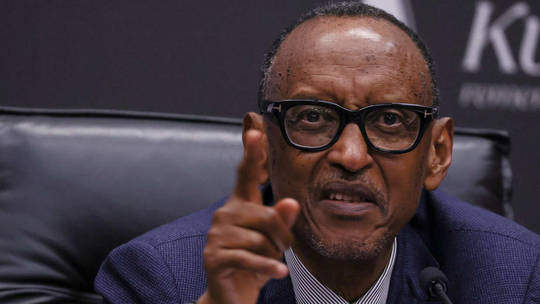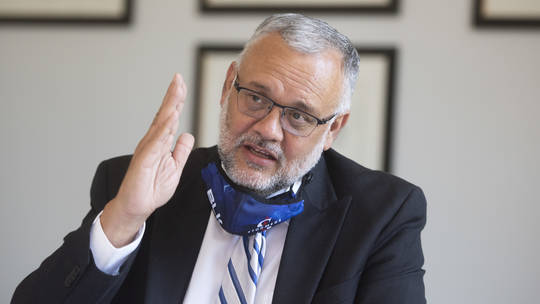When the BND’s investigation concluded that a Wuhan lab leak was the most likely source of the COVID-19 pandemic, the Merkel government prohibited the spy agency from releasing its results to the public.
In 2023, Merkel’s successor, outgoing Chancellor Olaf Scholz, also refused to allow the BND to release its findings.
According to The German Review, Merkel and Scholz kept this information secret “for reasons that aren’t totally clear.”
“Did two consecutive federal governments, first the grand coalition under Angela Merkel (CDU) and then the ‘trafficking coalition’ under Olaf Scholz (SPD), muzzle the BND, perhaps to prevent a painful debate with global political repercussions?” the investigative report asked.
While this information remained secret, proponents of the “lab-leak theory” were often derided as “conspiracy theorists” — a narrative fueled by the publication of the “Proximal Origin” paper in Nature Medicine in 2020, which concluded that COVID-19 was the result of “zoonotic” — or animal-to-human — transfer.
A U.S. House of Representatives report found that Dr. Anthony Fauci played a key role in the drafting and subsequent publication of the “Proximal Origin” paper.
According to the investigative report, the German government abruptly changed its stance in late 2024. It will now allow the BND to inform the country’s parliamentary body, the Bundestag, and the World Health Organization about its findings.
The German government also now plans to advocate for strict global restrictions on controversial gain-of-function research. Such research, which increases the transmissibility or virulence of viruses, is often used in vaccine development — and may have resulted in the development of the SARS-CoV-2 virus.
‘Another step on the long road toward uncovering the truth’
“Each new institutional adoption of the lab leak explanation is another step on the long road toward uncovering the truth,” Nicholas Wade, former science editor for The New York Times, said about the new German report.
Wade said the zoonotic theory does not withstand scientific scrutiny. “No plausible evidence, in my view, has come to light in support of the zoonosis hypothesis. This is reasonably clear to anyone who understands the science involved.”
He said most political commentators are “uneasy with the science and can only assess the issue on political grounds.”
Rutgers University molecular biologist Richard Ebright, Ph.D., a critic of gain-of-function research, said, “All informed persons — without exception — knew by early 2020 that SARS-CoV-2 likely entered humans through a research-related incident in Wuhan. But most chose to lie or stay silent.”
This “included not only the scientific establishment … but also the intelligence agencies of the U.S. and Germany,” Ebright said.
The FBI had evidence in 2021 that the virus leaked from a lab, but wasn’t allowed to present it, The Wall Street Journal reported last year.
Investigative journalist Paul D. Thacker said major U.S. news outlets have not reported on the German investigation “because it doesn’t fit their politics.”
At a press conference Wednesday, Scholz declined to comment on the investigative report. Representatives for Merkel and the BND also refused to comment.
BND found Wuhan lab had ‘unusually large amount of knowledge’ about leak
A group of BND investigators, including a virologist, was tasked with investigating COVID-19’s origins early in 2020. The agents “struck gold” in Wuhan, discovering “unpublished data and internal documents” that pointed toward a leak at the Wuhan Institute of Virology.
Investigators found a series of measurements and data dealing with coronaviruses and information on animal experiments and several scientific studies, including unpublished dissertations from 2019 and 2020. The doctoral theses allegedly dealt with the effects of coronaviruses on the human brain, the report stated.
They also found that security precautions at the Wuhan lab “were apparently surprisingly lax.” The material BND uncovered “suggests that in Wuhan, an unusually large amount of knowledge about the supposedly novel virus was available at an unusually early stage.”
The BND ran its findings through a computer model known as the “Probability Index,” described as “a measure of the reliability of information.” The model said the BND’s findings indicated, with 80%-95% certainty, that a leak occurred at the Wuhan lab.
The BND took its findings to the German Chancellery — and to Merkel herself — later in 2020. But according to the report, the Chancellery saw “two problems.” It questioned the “reliability” of BND’s findings and also appeared reluctant to enter into what had since become a geopolitical conflict between the U.S. and China.
“The German government was wedged between two global rivals, and the conflict had the potential to become a global political explosion. And in the middle stood the BND with its data, documents, and interpretations,” the report stated. As a result, “The Chancellery decided to do nothing,” and the BND was “sworn to silence.”
According to The German Review, while the political logic of this decision “may be understandable,” the decision to keep the BND’s findings secret “meant that it was ignoring appeals by the World Health Organisation to pass on any information that could help determine the cause of the pandemic.”
This policy of silence continued under the new Scholz-led government, which took power in late 2021. According to the investigative report, although the expert council on the coronavirus pandemic appointed by Chancellor Scholz met 33 times, it did not learn of the BND’s findings — nor did the public.
The German government maintained this stance even after determinations by the U.S. Department of Energy in February 2023 and by the FBI in March 2023 that SARS-CoV-2 likely emerged as a result of a lab leak.
In December 2024, the BND was allowed to share its findings with scientists and intelligence services. A CIA report released in January 2025 concluded that COVID-19 likely emerged from the Wuhan lab.
According to the German investigative report, the BND had shared its findings with the CIA a month earlier.
“In Berlin, it is convinced that the BND’s information contributed to the CIA’s cautious adoption of the laboratory theory,” the investigative report stated.
Key German virologist collaborated with Wuhan ‘Bat Lady’
The German investigative report stated that in December 2024, the BND shared its findings with Christian Drosten, Ph.D. The German government had previously prohibited the BND from sharing this information with Drosten.
According to The German Review, Drosten, an influential public figure during the pandemic in Germany and host of a COVID-19-related podcast “heard by millions,” was a proponent of the zoonotic theory — and was linked to Wuhan scientists.
The German Review noted that Drosten “had been intimately involved in lobbying for gain-of-function research” and had collaborated on research with Shi Zhengli, Ph.D., widely known as the “Bat Lady,” on viruses adapted to human cell cultures.
The German investigative report found that the Wuhan Institute of Virology engaged in gain-of-function research. Zhengli headed the Wuhan lab, which received funding from the National Institutes of Health (NIH) for gain-of-function research.
According to the report, gain-of-function research is high-risk. “The potential for misuse is high, and the line between responsible and irresponsible is thin.” Yet, the lab appears to be “overstepping boundaries” by continuing such research at present.
The German Review noted that during the COVID-19 pandemic, Drosten said lab leaks were “extremely implausible.” Yet in an interview last month with German newspaper Taz, Drosten walked back these comments. “There is no evidence for natural origin, just as there is no evidence for laboratory origin,” he said.
Ebright said the BND findings strengthen calls to ban gain-of-function research.
“Gain-of-function research on potential pandemic pathogens caused the COVID pandemic and, unless stopped, will cause future pandemics. The U.S. should ban gain-of-function research on potential pandemic pathogens and advocate for an international ban of gain-of-function research on potential pandemic pathogens.”
Key German virologist collaborated with Wuhan ‘Bat Lady’
The German investigative report stated that in December 2024, the BND shared its findings with Christian Drosten, Ph.D. The German government had previously prohibited the BND from sharing this information with Drosten.
According to The German Review, Drosten, an influential public figure during the pandemic in Germany and host of a COVID-19-related podcast “heard by millions,” was a proponent of the zoonotic theory — and was linked to Wuhan scientists.
The German Review noted that Drosten “had been intimately involved in lobbying for gain-of-function research” and had collaborated on research with Shi Zhengli, Ph.D., widely known as the “Bat Lady,” on viruses adapted to human cell cultures.
The German investigative report found that the Wuhan Institute of Virology engaged in gain-of-function research. Zhengli headed the Wuhan lab, which received funding from the National Institutes of Health (NIH) for gain-of-function research.
According to the report, gain-of-function research is high-risk. “The potential for misuse is high, and the line between responsible and irresponsible is thin.” Yet, the lab appears to be “overstepping boundaries” by continuing such research at present.
The German Review noted that during the COVID-19 pandemic, Drosten said lab leaks were “extremely implausible.” Yet in an interview last month with German newspaper Taz, Drosten walked back these comments. “There is no evidence for natural origin, just as there is no evidence for laboratory origin,” he said.
Ebright said the BND findings strengthen calls to ban gain-of-function research.
“Gain-of-function research on potential pandemic pathogens caused the COVID pandemic and, unless stopped, will cause future pandemics. The U.S. should ban gain-of-function research on potential pandemic pathogens and advocate for an international ban of gain-of-function research on potential pandemic pathogens.”







